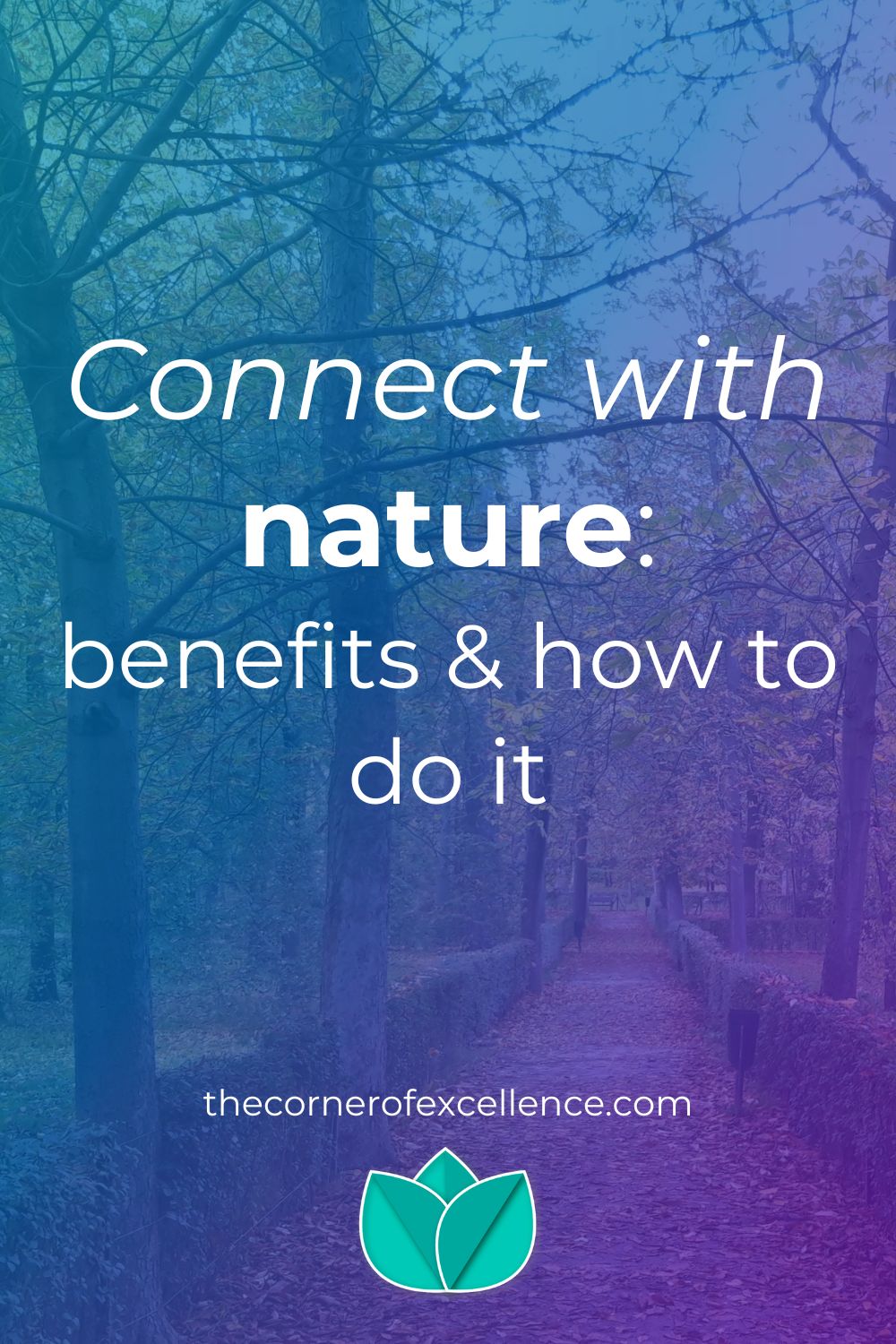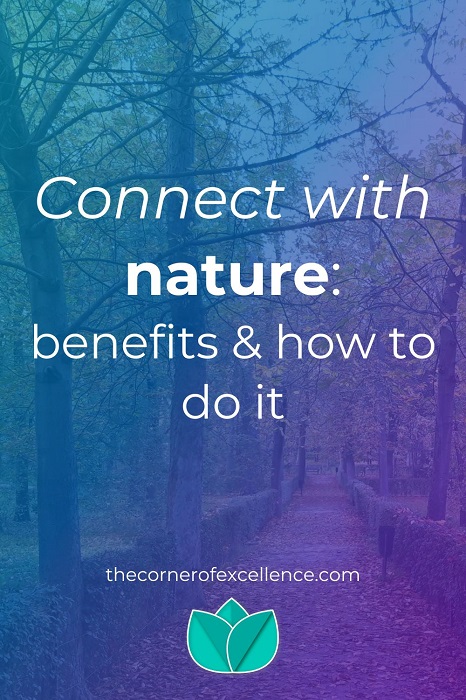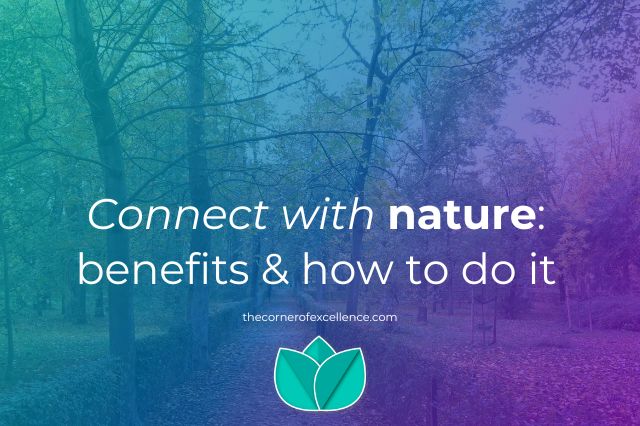
Imagine yourself in a forest or a park. What sensations do you associate? There are several ways to connect with nature; and it is something we need. However, we may not be aware of it. How often do you search a connection with nature? Let us look at the benefits of connecting with nature and the ways in which you can practice it.
Science and connection with nature
The German psychoanalyst and philosopher Erich Fromm defined biophilia as the passion for everything living. Later the American entomologist and biologist Edward Osborne Wilson delved into this concept in his book entitled “Biophilia.” According to him we have an innate affinity and empathy with nature. Connecting with nature is vital for our cognitive, emotional, spiritual and aesthetic development. When we lose that connection we suffer.
In the 1980s the Japanese government conducted a study on the medicinal benefits of the forest bath, Shinrin-yoku. Since then they have opened forest therapy centres and created the specialty of forest medicine in Japanese universities.
According to various studies, connecting with nature is an innate feeling to the healthy human being. Our ancestors adapted to nature to live with and survive in it. We urbanites are losing that connection and that knowledge. But appreciating our environment, protecting and caring for all living things, fauna and flora, is important for our survival. Not only because the Earth is our home but also because disconnection from nature has negative consequences for our health and well-being.
The benefits of connecting with nature
Connecting with nature has many benefits for our health and our physical, mental, emotional and spiritual well-being. Nature offers impressions for all our senses with its colours, textures, sounds and smells.
Physical benefits
We oxygenate our body and reduce cortisol, the so-called stress hormone. With this we strengthen our immune system and reduce all stress-related conditions.
We prevent cardiovascular diseases by controlling the blood pressure. We also improve our endocrine system. This is a cellular communication network that regulates, for example, our metabolism and digestive system. We reduce headaches and muscle tension. We even reduce the risk of asthma, arthritis, diabetes, skin or weight problems for example.
Also, exposure to nature and natural light helps us to regulate our biological cycles and improve the quality of our sleep. With this we reduce related pathologies such as chronic fatigue or hyperactivity.
Mental benefits
Connecting with nature and reducing stress also helps relieve anxiety, discomfort, sadness, and depression. It also improves our memory and our breadth of vision. Did you know that green is the colour we can distinguish more shades from? Our ancestors needed it to survive and orient themselves.
Immersing ourselves in nature allows us to preserve that ability. It also allows us to look beyond the next block of cement. Looking far to the horizon or along a pathway trains our vision. And that also helps us look beyond figuratively. That is why connecting with nature also improves our creativity and artistic ability.
Emotional benefits
Enjoying nature improves our mood. It makes us feel calm and in peace. It also gives us a feeling of freedom, strength and health that positively affects our self-esteem.
Spiritual benefits
At the beginning I mentioned biophilia as the affinity with nature. Connecting with nature allows us to better appreciate our surroundings. Marvelling at the sky, the sun, the stars, the plants and the animals nourishes us on a spiritual level. It makes us more grateful to our mother Earth.
How to connect with nature
Now that we have seen all the benefits, I suppose you will want to connect more with nature. But we do not always have the possibility to get away from the city for hours or days. However, there are many ways to find a connection with nature in our daily lives, if only just for a couple of minutes. Let us look at some proposals for when you have less or more time.
Look out of the window
I propose that you look out the window several times a day. Observe the sky, the clouds, the sun, the birds that may be flying and the plants that you see. Feel the temperature, the air, the sunbeams on your face or raindrops. Try to listen to the sounds of nature amidst the city noise. Watch the grass or leaves sway in the wind. Observe the flight of birds or insects.
Walk through nature
This is obviously the classic. Taking a walk through the countryside, a forest, the mountains, the beach or a park allows you to connect with nature. Try to park your thoughts and pay attention to your surroundings. Contemplate the different shades of the earth, the plants and trees. As in the previous point, observe all the flora and fauna and open your senses to the sensations, smells and sounds.
If possible, even walk barefoot for a bit. Experience the temperature, humidity level and texture of the soil. Not only will it allow you to connect more with nature, but it is also good for your feet which spend their lives caged in shoes.
Immerse yourself in nature
Be it a park, a forest, a mountain or a beach, hold in for a while. Sit down and immerse yourself in your surroundings. Soak up the visual, auditory, olfactory and tactile sensations.
Inhale the characteristic smells of the season: the smell of earth, plants and trees, sand and sea etc. Sharpen your ears to hear the animals around you: birds, insects, squirrels or whatever. Look around you. Then focus on something in particular and observe it very carefully: the grass, a plant, a flower or a tree. Take time to contemplate and appreciate it. Even get closer and smell a flower, a tree, a leaf.
Practice being present in nature
In relation to the previous point, pay full attention to the present moment. Enjoy being here and now, without haste and without judgment. Practice contemplation or meditation benefiting from the natural environment. There are even mindfulness or meditation groups that you can join if you prefer to practice with a guide.
Practice sports outdoors
Exercising outdoors allows us to benefit from the buffet for the senses that nature offers us. We expose ourselves to natural light and the aromas of nature. With this, we oxygenate our body better and produce more endorphins.
You can go running, skating or ride a bike. But you can also join groups that practice crossfit, yoga, taichi etc. outdoors. Moreover, you can go hiking, mountaineering, swimming, diving or horse riding for example.
Get your creative side out
Do you like to draw or paint? Then go outside and sit down to capture your surroundings on paper. If you prefer photography, appreciate nature by immortalising the scenery with your phone or camera. Other ideas can be to collect leaves or chestnuts to make crafts with your children. Or go into the forest to collect berries or mushrooms and then cook a delicious dish or bake a yummy cake.
Do you usually connect with nature?
Did you know all the benefits of connecting with nature? Do you usually take time for it? If so, which are your favorite activities outdoors?

Sharing is caring!





4 responses
In the weeks to come, I am hoping to get more time outdoors. With the cooler weather settling in, I want to have time to go on hikes and walks again. My goal is to boost my health in all aspects as we head into the new year. It was refreshing to see all the benefits that come from being outside.
Hi Emily! I hope you take time for walks and hikes. Apart from the health benefits, it just makes you feel invigorated and generally so much better.
Nature brings me and joy and I always find the answers that I need within nature.
from what I can see, most of my friends finally were able to connect with the nature in 2020